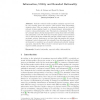Free Online Productivity Tools
i2Speak
i2Symbol
i2OCR
iTex2Img
iWeb2Print
iWeb2Shot
i2Type
iPdf2Split
iPdf2Merge
i2Bopomofo
i2Arabic
i2Style
i2Image
i2PDF
iLatex2Rtf
Sci2ools
108
click to vote
AGI
2011
2011
Information, Utility and Bounded Rationality
Abstract. Perfectly rational decision-makers maximize expected utility, but crucially ignore the resource costs incurred when determining optimal actions. Here we employ an axiomatic framework for bounded rational decision-making based on a thermodynamic interpretation of resource costs as information costs. This leads to a variational “free utility” principle akin to thermodynamical free energy that trades off utility and information costs. We show that bounded optimal control solutions can be derived from this variational principle, which leads in general to stochastic policies. Furthermore, we show that risk-sensitive and robust (minimax) control schemes fall out naturally from this framework if the environment is considered as a bounded rational and perfectly rational opponent, respectively. When resource costs are ignored, the maximum expected utility principle is recovered.
AGI 2011 | Artificial Intelligence | Minimax Control | Rational Decision Makers | Variational Principle |
Related Content
| Added | 24 Aug 2011 |
| Updated | 24 Aug 2011 |
| Type | Journal |
| Year | 2011 |
| Where | AGI |
| Authors | Daniel Alexander Ortega, Pedro Alejandro Braun |
Comments (0)

